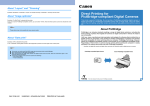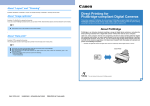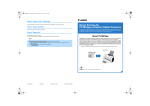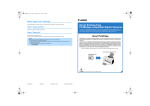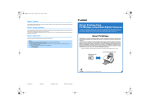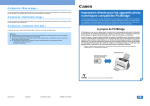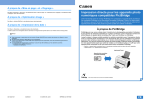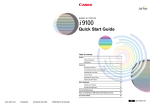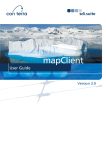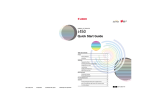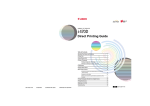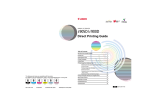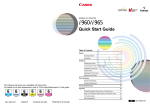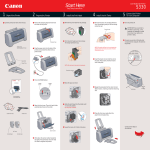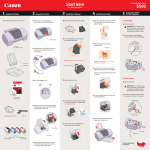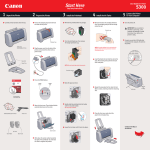Download Canon i960 Series Instruction Guide
Transcript
PictBridge_i960_US.fm Page 1 Thursday, June 5, 2003 3:58 PM About “Layout” and ”Trimming” By default, “Borderless” is selected in “Layout” and “Off (No trimming)” is selected in “Trimming” for this printer. About “Image optimize” By default, “On (Exif Print)” is selected for this printer. If you use a Canon PictBridge-compliant camera, you can select "VIVID", "NR", or "VIVID+NR". (Note that these options cannot be selected for some models.) ● When "VIVID" is selected, green and blue portions of photos are printed vividly. ● When "NR" (Noise Reduction) is selected, noise in blue portions, such as the sky, and dark portions is removed. ● When "VIVID+NR" is selected, functions of both "VIVID" and "NR" are performed. Direct Printing from PictBridge-compatible Digital Cameras This printer supports PictBridge. By connecting a PictBridge-compatible digital camera or digital camcorder to a PictBridge-compatible printer with a single cable, users can easily control the print setting using their camera and produce high-quality photos without using a PC. About PictBridge PictBridge is an industry standard enabling a range of digital photo solutions, including the direct printing of photos from digital still cameras or digital camcorders* without the need to use a computer. Until now, many manufactures had proprietary technologies for allowing direct printing from a digital camera or camcorder. This resulted in limited combinations of cameras and printers that were compatible for direct printing without a computer. PictBridge Technology, however, allows any PictBridge-compatible camera to print directly to any PictBridge-compatible printer. Regardless of the printer or camera brand, printing photos without a computer is easily achieved if the camera and printer are both PictBridge-compatible. About “Date print” By default, “Off” is selected for this printer. If "On" is selected, shooting date recorded in Exif image data is printed in the lower-right corner of each photo. * Hereafter, the digital still camera and digital video camcorder are collectively called a digital camera or camera. PictBridge-compatible Digital Camera Canon PictBridge-compatible Printer ● This printer can handle only Exif/JPEG image data to produce photos using PictBridge. ● Never disconnect the USB cable during printing. ● When disconnecting the USB cable between the digital camera and the printer, follow the instructions given in the Instruction Manual of Camera. ● Controls of the digital camera cannot be used for the following: • Print quality setting • Printer maintenance This mark indicates that the product is PictBridge-compatible. Latest Inforfmation about PictBridge For the latest information about PictBridge, please select [Support] at http://canon.jp/. QA7-2963-V01 XX2003XX ©CANON INC.2003 PRINTED IN THAILAND PictBridge_i960_US.fm Page 2 Thursday, June 5, 2003 3:58 PM Connecting to a Digital Camera About Digital Camera Settings To connect a PictBridge-compatible digital camera to this printer, use the USB cable supplied with the digital camera for connection to a computer. When operating the camera, be sure to follow the instructions given in the Instruction Manual supplied with the camera. Let’s take a look at the paper size, paper type, layout, image optimization modes, and date printing modes that can be set on the PictBridge-compatible camera connected to the printer. Confirming or Changing the Camera Settings Do not connect any equipment other than the camera ready for “PictBridge” or Canon “Bubble Jet Direct” to the Direct Print Port of the printer. Otherwise, electric shock, fire, or damage to the camera could result. ● When printing photos with the digital camera connected to the printer, it is advisable to use the AC adapter supplied with the camera. If you use the camera battery, be sure to charge it fully. ● Depending on the model or brand of your camera, you may have to select a mode of printing photos in compliance with “PictBridge” before connecting the camera. You may also have to turn on the camera or select Play mode manually after connecting the camera to the printer. Perform necessary operations according to the Instruction Manual supplied with your camera. 1 Set up the printer. Follow the procedure explained in the Easy Setup Instructions supplied with your printer. When a PictBridge-compatible camera is connected and printing is started with no setting changes selected, this printer operates based on the following default settings: To change the paper size or paper type, operate the camera to select the PictBridge print setup mode and confirm or check the settings. – Paper Size ...................................... 4" × 6" – Paper Type.............................................Photo (Photo Paper Plus Glossy) – Layout ...................................................Borderless – Trimming...............................................Off (No trimming) – Image optimize......................................On (Exif Print) – Date print...............................................Off (If "On" is selected, shooting date is printed in the lower-right corner of each photo.) About the Settings Explained Below The settings explained below cannot be made depending on the brand or model of your camera. If any setting cannot be made, the default setting explained above is used. Names of settings that are displayed on Canon PictBridge-compatible cameras are used in the description given below. Different names may be displayed on your camera depending on the brand or model. About “Paper Size” and “Paper Type” The print head cannot be aligned using the controls of the digital camera. To align the print head, connect the printer to the computer. 2 3 Turn on the printer. By default, 4" × 6" is selected in “Paper Size” and “Photo” (Photo Paper Plus Glossy) is selected in “Paper Type” for this printer. To use Photo Paper Pro, select “Fast Photo” in “Paper Type”. If using a Canon PictBridge-compatible camera, you can select 5" × 7" in “Paper Size”. The following sizes and types of paper can be loaded in the printer by selecting options in “Paper Size” and “Paper Type”. Connect the digital camera to the printer. (1) Make sure that the camera is turned off. (2) Connect the camera to the printer using the USB cable (for connection to a computer) supplied with the camera. (3) Set up the camera for direct printing. When the connection between the camera and printer has been established, the POWER lamp on the printer will flash green one time. “Paper Size” setting “Paper Type” setting Paper loaded in printer 4" × 6" (Default) Photo (Default) Photo Paper Plus Glossy Fast Photo Photo Paper Pro Photo Photo Paper Plus Glossy Fast Photo Photo Paper Pro Photo Photo Paper Plus Glossy 8.5" × 11" (Letter) 5" × 7" *1 The power-on sequence may differ depending on the model or brand of the camera. *1 This size can be selected only for Canon PictBridge-compatible cameras. (Note that it cannot be selected for some models.)


